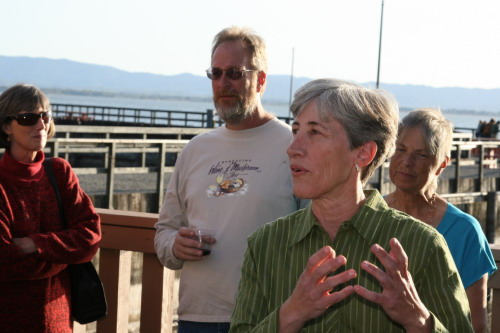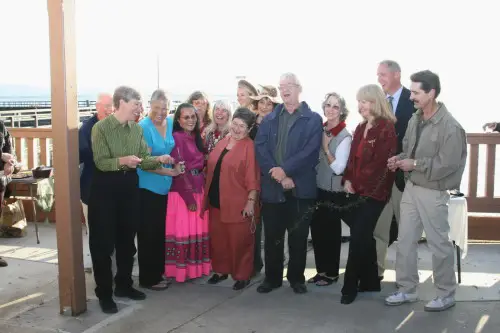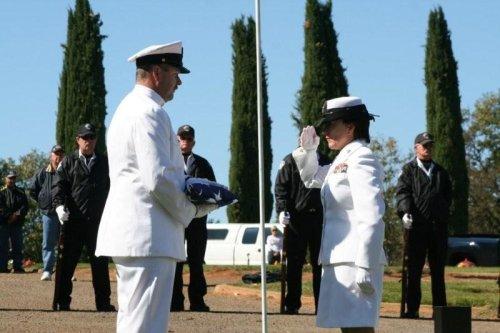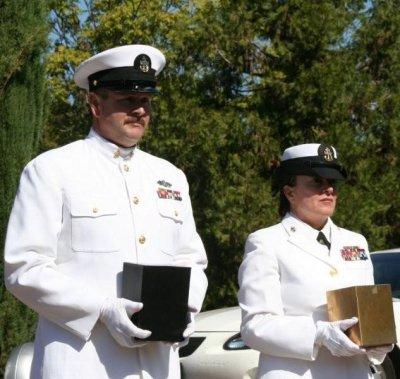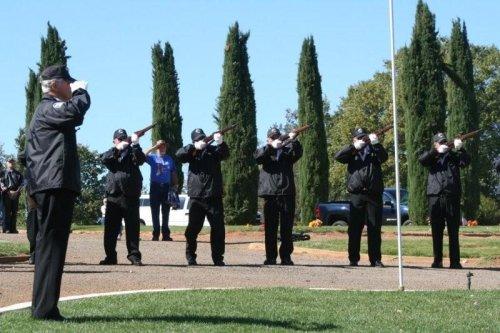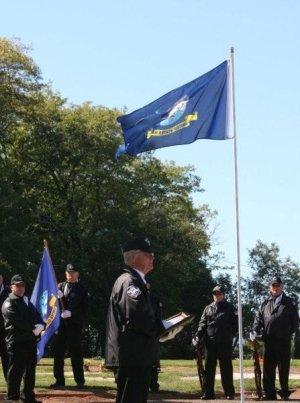
Harbor Village Artists features 20 talented local artists and craftspeople in a newly renovated facility on the lake in Lucerne. Photo by Harold LaBonte.
LUCERNE – The new Harbor Village Artists center is a cluster of four charming Alpine-style artist cottages tucked into a park-like setting in the town of Lucerne on the north shore of Clear Lake in Northern California. Each cottage houses a retail art gallery and working art studio featuring works for sale by local and regional artists.
Artist works for sale include original oil, acrylic, and watercolor paintings, Pomo baskets, sculpture, jewelry, original gourd art, gifts and hand-painted tiles.
Gallery shops include The Gourd Gallery, Konocti Art Gallery/Studio, Lakeside Art and Pomo Fine Arts Gallery.
Meet the artists:
Sandie Coelho-Davis
Sandie Coelho-Davis comes from a long line of Lake County pioneer families and, with her husband Jim, moved permanently back to her ancestral roots in 1989.
She was first introduced to gourds about 10 years ago and seriously got involved when a friend started the Bachelor Valley Gourd Club in June 2005. She enjoys the many friendships and creative gourd artists.
Coelho-Davis continues to learn new techniques and understands why the gourd has been in use for centuries. While she uses several gourd art techniques, woodburning has become a favorite.
In July of 2008, she and her gallery partners, Linda Kelly and Marilyn Crayton, opened The Gourd Gallery, the first gallery just for gourds in California. Coelho-Davis sells her work at the gallery and at craft fairs and gourd festivals.
Marilyn Crayton
Marilyn Crayton was born, raised, and employed in San Francisco before retiring to Lake County in 1998.
A guest speaker at a local garden club meeting first introduced her to gourds in 2000. Several years later, she began working with a few gourds that she had previously purchased. While she has never had any formal art classes, Crayton has taken a handful of one-day classes at gourd festivals, and in June 2005 she started a local gourd club that meets monthly.
Today, Crayton grows many of her own gourds on her ranch in Witter Springs. These gourds come in many shapes and sizes. At the end of the growing season, the gourds are picked and set out to dry slowly. When fully dry, the gourds are cleaned and decorated.
Virtually any technique that can be used on wood or leather can be applied to a gourd, including burning, dyeing, carving, staining, painting, sewing, etc. The choices seem to be limitless.
Crayton sells her gourds at local shops, The Gourd Gallery in Lucerne, and at several craft fairs.
Joan Facca
Joan Facca was born and raised in Redwood City and raised her family in Fremont. Facca spent many childhood summers at Clear Lake and moved to Lake County with her husband in 1985. Her love of art began at a very early age.
Mostly self-taught, Joan began painting with oils and moved to pastels, the medium she finds most rewarding. Her pastel landscapes reflect her love and respect for the natural world and the exceptional beauty of Clear Lake.
Ray Farrow
Ray Farrow was born in England and educated in England, Canada, and the United States. He developed his passion for painting after a successful career in the international resort industry.
Farrow is self-taught with the help of workshops, videos, books and through his association with other artists who, like himself, continue to hone their skills by painting daily.
He enjoys exhibiting his work where he learns from the comments and feedback of viewers and other artists. Farrow also is co-owner of Konocti Art Gallery/Studio in the artist colony Harbor Village Artists.
Meredith Gambrel
Meredith Gambrel considers her painting a hobby gone awry. She began painting and drawing at a very young age, studied at various art schools and colleges, and also studied under numerous well-known artists. Gambrel’s love of nature is the theme of most of her paintings.
While she has worked in most media, at the present time, her paintings are rendered in oil. Her love is to create beautiful paintings for all to enjoy.
Carolyn Hawley
Carolyn Hawley, former college music instructor and conductor of the Ukiah Symphony, is by profession a classical musician but has been painting since she moved to Mendocino and Lake counties in 1970. She is self-taught and has shown her work in numerous solo and group art shows,
locally and in the Bay Area.
Hawley has won many ribbons and prizes for her art, which critics have dubbed "magic realism." She paints landscapes, seascapes, skyscapes, people and animals and is inspired to capture the true "essence" of her subjects. She sells her paintings, prints, and gift cards in galleries and also by commission.
Lynn Hughes
Lynn Hughes is a Californian through and through. She was born and raised in San Francisco, and her great-grandparents were Lake County settlers.
Hughes was a stay-at-home mom with three children and returned to finish her college education at the age of 40. After working in San Francisco for 12 years, she retired in 1998 to a 16-acre horse ranch in
Bachelor Valley.
A combination of time and circumstance enabled Hughes to explore a new creative avenue, jewelry making, an adventure that has been filled with supportive friends, inspiring teachers, books and magazines, as well as joyful hours seeking just the right “ingredients” to make something beautiful.
This spring, Hughes was published in a national magazine with another piece of jewelry to be featured in Beadunique in spring 2009. She creates jewelry for pleasure.
While she finds it gratifying to receive compliments about her jewelry, she finds the biggest compliment in having a piece of her jewelry sell.
Linda Kelly
Linda Kelly had always wished to move to Lake County, and 10 years ago that wish came true when she moved from San Jose. She loves Lake County, its beauty and how friendly the people are. Her daughter and son, grandchildren, and even a great-grandchild live in San Jose.
Kelly has always enjoyed crafts and also enjoys gardening. Once, she was given a few gourd plants that she planted and watched as they grew to cover a 30-foot fence with a beautiful vine and about 26 huge gourds. At the time, she had no idea what to do with them, so she stored them in the garage.
Upon moving to Lake County, she met a group of gourd artists who happily took the gourds and created a form of art that, until then, Kelly had never seen.
Then three years ago, Kelly, along with her sister, Sandie Coelho-Davis, and fellow gourd artist Marilyn Crayton formed the Bachelor Valley Gourd Club, which now has grown to 22 members. Together, they recently opened The Gourd Gallery.
Kelly also shows beautiful, artistic gourds at craft fairs and gourd festivals and in local shops.
Barbara LeVasseur
Barbara LeVasseur has been self-employed for 27 years, painting on ceramic tiles with her own glazes for homes and businesses. She has produced custom tile gifts for Williams-Sonoma, Sur la Table and Gardener’s Eden catalogs, as well as custom corporate gift tiles for the Heinz Corp. for the last 11 years. She is the owner of Frozen in Fire Tile.
LeVasseur has studied privately with teachers for graphics, photography and painting over the years and has a fine arts degree from the Rochester Institute of Technology School of Art and Design. Her painting media are oil, gouache and ceramic glaze.
While serving on the Board of Directors of the Lake County Land Trust, LeVasseur began the Art and Nature Show at Rodman Preserve, an annual fundraiser and public outreach event that she has chaired for the last six years. She is a member of Lakeside Art, the Konocti Art Society and the Konocti Plein Air Painters.
Diana Liebe
Diana Liebe is a lifelong artist, winning her first competition at the age of 8. She holds a bachelor’s degree in fine art and education. Her experience in arts and crafts is varied, and she has been working in watercolors and hand-painted clothing for the past 10 years.
Liebe keeps involved with the Lake County communities through several art groups including the Lake County Arts Council, Main Street Gallery, the Konocti Arts Society and the Plein Air Painters. She enjoys meeting new friends and staying active in the community.
Carolyn Morris
Carolyn Morris is a 30-year resident of Lake County. She and her husband are longtime business owners of a local video store and currently live in Buckingham Estates, where she enjoys painting garden scenes. She has two grown children who reside in the Petaluma area.
Morris is a self-taught artist who has painted for many years on the side. Her favorite medium is that of oil painting and her goal is to spend more time painting and make a career out of what she loves. She enjoys painting local scenes and the vast opportunities that life in Lake County has offered for beautiful scenery and festive events to feature in her artwork.
Patricia Oates
Patricia Oates is a native of Marin County, and upon moving to Lake County 25 years ago, found a love of Mt. Konocti, much as she had loved Mt. Tamalpais in Marin.
When Oates started painting in earnest, she painted only Mt. Konocti for several years but has since painted other subjects. She is always trying new ideas, new techniques and new palettes. Her teachers have been Lorraine Brady Hull, Sandra Powell, Pat Hopper and Jack Balance, and she has attended workshops with Hope Stevenson, Armand Cabrera, and Adele Pruitt. Her main interest is, and
probably always will be, the landscape.
Oates and her husband Jarth owned and operated a local dry-cleaning business for 19 years and were active in the Lakeport Regional Chamber of Commerce; she also was on the board of the Lakeport Main Street Association. Since selling the cleaners two years ago, Oates has devoted much of her time to her artwork and art events in the county.
She belongs to the Konocti Plein Air Painters, the Konocti Art Society and the Lake County Arts Council. She is pleased to be a part of Lakeside Art and the Harbor Village Artists.
Richard Seisser
Richard Seisser finds real joy in painting with pastels, saying it has opened a window into another world, so vast, and more beautiful than any world he could imagine. He loves to paint the places he visits in nature with all its beauty and mystery and tries to visualize what is there and capture the unusual on paper.
After graduating from art school in 1955, Seisser spent his early years sketching, drawing with pen and ink, and painting with watercolors and acrylics. He recently began working with pastels and has discovered that his years of sketching and drawing gave him the advantage needed to discover the soft vagueness of pastels, the distinctive line of pastel pencil and the brilliant contrast of rich pastel colors.
Seisser became an avid reader and studied the works of master pastel artist Elizabeth Mowery. He credits patterning much of his style of pastel painting after her work.
He and his wife Mary married in 1961 and set about a life together to raise two daughters. After many years in industry, he retired and came to California determined to become an artist, a good artist. He
says he’s still working at it.
Jackie Smythe
Jackie Smythe has been painting for several years. She has taken classes at Mendocino College. Her art includes painting in oil and watercolor, and drawing in pencil, charcoal, and ink. She enjoys painting still life, peaceful landscapes, portraits and photography.
Ruth Wagner Morgan
Ruth Wagner Morgan was born in Detroit in 1950 and grew up in the suburbs. She studied painting and printmaking at Eastern Michigan University and graduated with a Bachelor of Fine Arts in 1972. She moved to California in 1975, where she worked as a draftsperson in engineering offices and painted whenever she could.
She met and married artist and tile contractor Jackson Morgan in 1988 and lives in Jerusalem Valley with her family and an assortment of tame and wild creatures. She has shown and sold paintings at the Jessel Miller Gallery in Napa for the past 20 years.
Luwana Quitiquit
Luwana Quitiquit has been weaving traditional Pomo baskets for more than 30 years. She became interested in basketweaving as a student at the University of California at Berkeley and traveled many miles to study with renowned Pomo basketweaver Mabel McKay. As a student who also was raising a family, it was difficult for her to find time for weaving, but she was determined to learn.
When Quitiquit retired and finished raising her family, she decided to dedicate her life to teaching basketry. She also has started a native nursery where she cultivates the plants needed for weaving because these materials have become scarce in the region. She also uses only indigenous materials, including handmade dogbane cordage and twine, in place of the usual commercial cotton cord or fish line.
One of Quitquit's goals is to train her students to be instructors so they can then carry on the basketweaving tradition. In fact,she has taught representatives from the seven Lake County Pomo tribes traditional basketweaving techniques. She also now operates a retail gallery studio, called the Pomo Fine Arts Gallery at the Harbor Village Artists center.
Harbor Village Artists is located at 6197 East Highway 20, adjacent to Lucerne Harbor Park, in Lucerne. For information about Harbor Village Artists, call 707-274-2346.
{mos_sb_discuss:2}

 How to resolve AdBlock issue?
How to resolve AdBlock issue? 



